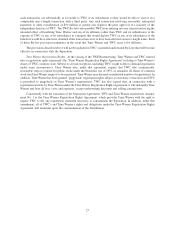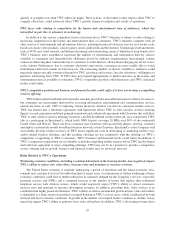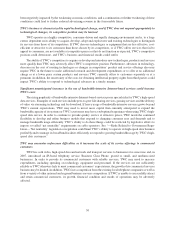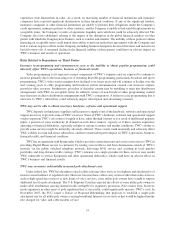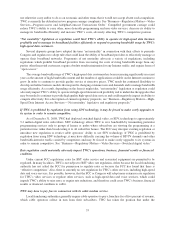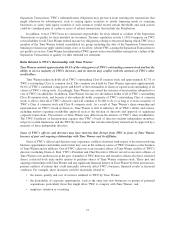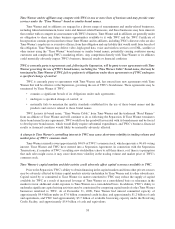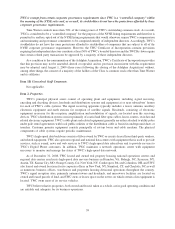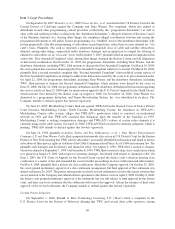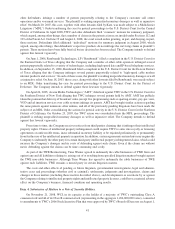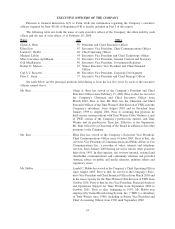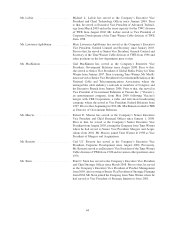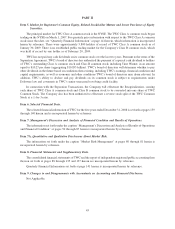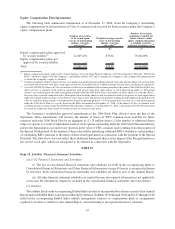Time Warner Cable 2008 Annual Report Download - page 47
Download and view the complete annual report
Please find page 47 of the 2008 Time Warner Cable annual report below. You can navigate through the pages in the report by either clicking on the pages listed below, or by using the keyword search tool below to find specific information within the annual report.Separation Transactions, TWC’s indemnification obligations may prevent it from entering into transactions that
might otherwise be advantageous, such as issuing equity securities to satisfy financing needs or acquiring
businesses or assets with equity securities if such issuances would exceed certain thresholds and such actions
could be considered part of a plan or series of related transactions that include the Distribution.
In addition, even if TWC bears no contractual responsibility for taxes related to a failure of the Separation
Transactions to qualify for their intended tax treatment, Treasury regulation section 1.1502-6 imposes on TWC
several liability for all Time Warner federal income tax obligations relating to the period during which TWC was a
member of the Time Warner federal consolidated tax group, including the date of the Separation Transactions.
Similar provisions may apply under foreign, state, or local law. Absent TWC causing the Separation Transactions to
not qualify as tax-free, Time Warner has indemnified TWC against such several liability arising from a failure of the
Separation Transactions to qualify for their intended tax treatment.
Risks Related to TWC’s Relationship with Time Warner
Time Warner controls approximately 90.6% of the voting power of TWC’s outstanding common stock and has the
ability to elect a majority of TWC’s directors, and its interest may conflict with the interests of TWC’s other
stockholders.
Time Warner indirectly holds all of TWC’s outstanding Class B common stock and approximately 82.7% of
TWC’s outstanding Class A common stock. The common stock held by Time Warner represents approximately
90.6% of TWC’s combined voting power and 84.0% of the total number of shares of capital stock outstanding of all
classes of TWC’s voting stock. Accordingly, Time Warner can control the outcome of most matters submitted to a
vote of TWC’s stockholders. In addition, Time Warner, because it is the indirect holder of all of TWC’s outstanding
Class B common stock, and because it also indirectly holds a majority of TWC’s outstanding Class A common
stock, is able to elect all of TWC’s directors and will continue to be able to do so as long as it owns a majority of
TWC’s Class A common stock and Class B common stock. As a result of Time Warner’s share ownership and
representation on TWC’s board of directors, Time Warner is able to influence all of TWC’s affairs and actions,
including matters requiring stockholder approval such as the election of directors and approval of significant
corporate transactions. The interests of Time Warner may differ from the interests of TWC’s other stockholders.
The TWC Certificate of Incorporation requires that TWC’s board of directors include independent members,
subject to certain limitations, and the TWC By-laws require that certain related party transactions be approved by a
majority of these independent directors.
Some of TWC’s officers and directors may have interests that diverge from TWC in favor of Time Warner
because of past and ongoing relationships with Time Warner and its affiliates.
Some of TWC’s officers and directors may experience conflicts of interest with respect to decisions involving
business opportunities and similar matters that may arise in the ordinary course of TWC’s business or the business
of Time Warner and its affiliates. One of TWC’s directors is an executive officer of Time Warner and five of TWC’s
directors (including Glenn A. Britt, TWC’s President and Chief Executive Officer) served as executive officers of
Time Warner or its predecessors in the past. A number of TWC directors and executive officers also have restricted
shares, restricted stock units and/or options to purchase shares of Time Warner common stock. These past and
ongoing relationships with Time Warner and any significant financial interest in Time Warner by these persons may
present conflicts of interest that could materially adversely affect TWC’s business, financial results or financial
condition. For example, these decisions could be materially related to:
• the nature, quality and cost of services rendered to TWC by Time Warner;
• the desirability of corporate opportunities, such as the entry into new businesses or pursuit of potential
acquisitions, particularly those that might allow TWC to compete with Time Warner; and
• employee retention or recruiting.
37


